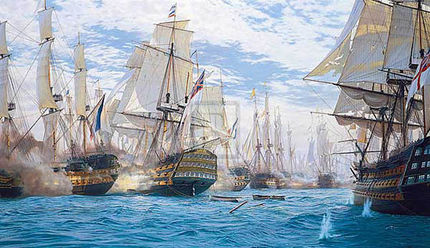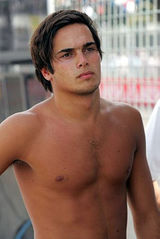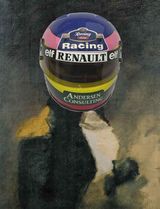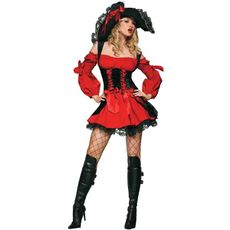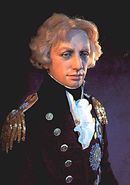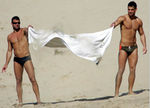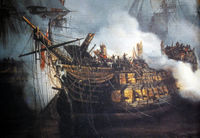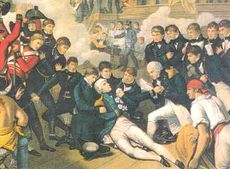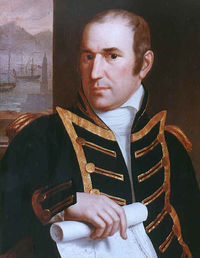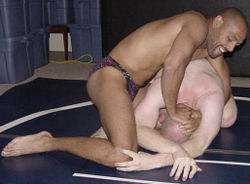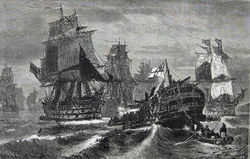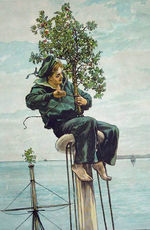Battle of Trafalgar
“England expects but Lady Hamilton delivers”
– Nelson
“I may be a cripple but I can beat any other navy one handed”
– Nelson
“In death he became a pigeon magnet”
– Duke of Wellington on Nelson
The Battle of Trafalgar (21 October 1805) was a naval battle in which combined French and Spanish fleets were smashed by the British Royal navy under the command of Admiral Nelson Piquet Junior (formerly Horatio Roger Nelson).[1] The Americans joined after the fighting had finished and claimed it was their 'victory', spinning a story how the US Navy Seals had got hold of the Franco-Spanish sailing times and passed this information to Nelson. When the British denied this happened, the Americans took this as a 'typical ungrateful Limey attitude' and was one of the reasons why the USA declared war on Britain in 1812 as 'pay back.' [2]
Origins
In 1802 France and Great Britain had signed a peace treaty at Amiens after a decade of trying to kill each other. France had fought under the banner Liberté, égalité, fraternité whilst the English had spilt their blood for Roast Beef, Yorkshire Pudding and Gravy. Both sides admitted they were mutually knackered after ten years of constant war ever since French king Louis XVI and his Austrian apple strudel wife Marie Antoinette had been downsized by a guillotine. The French had beaten or chased away everyone else's army but had been unable to crush the British at sea. This didn't make France's leader Napoleon Bonaparte very happy. He was also looking to upgrade his job as First Ford Consul of the French Republic for something a bit grander like Vice Ford Focus or Emperor Ford Intercontinental. So in 1804 Napoleon had invited Pope Pius VII to Paris for a supposed surprise party and instead held an imperial rave in Notre Dame. Now as Emperor Napoleon I he pretended that as he had a new job, he had no recollection of signing a treaty with the English or anyone called King George III. It would be war again.
In England, poet-singer-guitarist Joseph Strummer summed up the national mood:
The British sent a messenger to their great naval hero, Viscount Horatio Roger Nelson who was living in Sin (a little English hamlet next to the village of Much Fucking) with the blowsy Emma Hamilton. Nelson had been out of favour since he trashed Legoland back in 1801 in a drunken, rum fuelled rage after the battle of Copenhagen. Though the British had won and torched the Danish fleet, Nelson's subsequent on-shore rampage saw the disgraced sea pitbull relegated to the naval reserve on half pay and diluted brandy.
When peace came in 1802, Nelson had retrained as a one-handed gardener to please (and pleasure) Emma. But Nelson missed the sea spray, the sound of seagulls and the company of salty sailors so when the British admiralty offered him the command of the fleet against the old enemy, Nelson grasped the opportunity with one hand. He dropped his hedge-clippers and curlers and reported for duty once more. In a touching scene, Nelson walked out on Emma, telling her he was just popping out to buy a newspaper. It took the raddled floozy a few days to realise her patched-up paramour had gone forever, as Nelson had 'done a runner'.
Chase Me Nelson, Chase me!!
On his arrival in Portsmouth, where the main British fleet were anchored, Nelson ran into one slight problem: No sailors. The British terms and conditions for being one of 'His Majesty's Seafaring Patriots' was flogging, sexual harassment, bad food, years at sea, flogging, piss-poor wages, flogging...in other words, not very attractive at all. In desperation and with a devious mind which comes as second nature to the English,[3] crews were found for the fleet under the false prospectus of 'The Cruise You Won't Forget' package holiday deal. It worked, and before the crews realised what they had really signed up to, Nelson in command of the optimistically named Victory and his fleet were all at sea and hunting down the French.
Over in Paris, Napoleon worked on his plan to beat up the Russians and Austrians, seduce the Spanish, bribe the Prussians and trample the rest. He also ordered his top admiral, French-Canadian Jacques Villeneuve to set sail to the Caribbean with the French fleet to lure the British fleet away. Villeneuve did this by toploading a few ships with the best looking French women he could find and told them to tease the English sailors by flashing their choice body parts. Whilst the English sailors fought each other over telescopes to look at the French lust bait, the French navy slipped out of port and headed off towards the Caribbean. Napoleon meantime ordered his army to hide in triple-axle wagons with secret smuggling compartments, ready for the signal to sneak over the English Channel and take London.
When Nelson heard the news, he flew into a rage and ordered his fleet to give 'the French teasers' chase across the Atlantic. The British sailors hoped this meant they would be able to get some shore leave in Jamaica where the rum was cheap and the women plentiful, but Nelson was determined to fire a broadside up the bottom of Villeneuve. But the French gave him the slip again and were then reported to be returning to Europe. News had been received that a bored Napoleon had disembarked his troops and had gone off to fight the Austrians and Russians at the Battle of Austerlitz. The invasion of Britain was postponed.
Nelson was not to know this. Angry at being given the slip by Villeneuve, the British hero retired to his cabin and clean-plucked a cage of pigeons in anger. All this typical Gallic flirting had made his crew sick with sexual frustration and him wishing to be back with Emma. By the time Nelson got news the French were now somewhere near Spain. The British fleet were again undermanned and underhanded through desertion.
The Spanish Groove Armada Join In
Not wanting to be left out and thinking the British were going to get a Boney bashing, the Spanish declared war against the English under the weak excuse that Nelson had failed to pay his bar bills in Florida. Their admiral was the suspiciously clean-shaven Admiral Fred Carlos Gravina. He was a Sicilian in the service of Spain and so very good at conducting vendettas against enemies. Gravina had a particular hatred for Nelson as the latter had trashed his favourite family-owned Sicilian restaurant Omertà in Palermo. This was when Nelson first met Emma Hamilton at the residence of her husband Sir William Hamilton, then the British ambassador there and the new couple had celebrated by going out with their friends to celebrate with a monstrous drink, sex, and vandalism binge.
When the Spanish sighted Villeneuve's French teasers outside Cadiz, they were invited into the harbour to party like it was 1805. The allied Admirals tried to work out a plan but decided to stay in port in the hope that either Nelson and his fleet would be smashed by a hurricane or Emperor Napoleon had got across the English Channel without their help.
I Spy with My One Good Eye
The British arrived off the coast of Portugal in September 1805. Looking for new 'recruits' to join the fleet, Nelson learnt there were coach parties of Manchester United fans stranded there after a recent football game. Offering the men cheap booze and cheaper women (if they could find any), the British ships were soon fully tanked up with expectant sailors who were told the 'ripe stuff' were being hidden below decks on the French and Spanish ships. They fell for the bribe and happily put on their English football kit to get rid for the mammoth drinking/battle session promised on the 21st October.
In Cadiz, Gravina and Villeneuve realised if they stayed in the flesh pots of Cadiz any longer, they too were be trying to man ships without any crews so they upped anchor and headed out to look for somewhere else to sit out the rest of the war. But then the French and Spanish luck ran out. Just as they were slowly sailing up the coast of Spain near Cape Trafalgar, the English saw them and prepared for battle. This time there would be no time to reverse sail and head back to Cadiz. The winds were against them or perhaps it was strong flatulence blowing down from England. Either way, Nelson and his fleet were waiting.
The Fleets
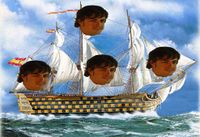
Trafalgar has often been compared to a giant game of water chess as it took so long for anything to happen. These were the days of sailing ships, which moved very slowly across the sea, and even if you saw an enemy fleet, it still took hours to actually get within firing range. Before then, you could have written a novel, played a few games of Tour of Naval Duty:South China Seas or lost your virginity to the First Mate. Others would write to their loved ones or jump overboard and swim for it but most really would just break out their beers and acquire their infamous 'Dutch Courage'[4] to get ready for a really horrible and messy death.
The two fleets were roughly evenly matched. The British had 27 ships, separated for class reasons into 'First Rates', 'Second Rates', 'Business Rates', 'Economy Rates' and 'Tourist Rates'. The British ships included the mighty Terrible Weather for this Time of Year and the ever reliable Jeeves to provide rum, blood, and sawdust sandwiches when afternoon tea would be served. The French and Spanish had 33 vessels of various sizes and funnier names. They included the biggest ego ship then afloat, the Spanish flagged Sanctimonious Fernando Alonso and the best dressed vessel in any fleet, the Don Ricky Martin.
The French admiral Villeneuve flew his flag from the goose-shaped Foie Gras. The mopey French-Canadian wished, more than ever, that he could be back in Canada, whacking a black disc across an icy lake. Sailing close to his ship was Fromage Mangeant Se Rendre Singe, its monkey mascot tied to the wheel and with what seemed a surplus collection of white sheets. Just in front of them was the twin-hulled Marion Cotillard, bobbing up and down perkily to remind everyone that the French ships were really a lot hotter than the clapped-out cross-channel ferry style boats the English preferred to sail in.
Nelson called a ship-to-ship semaphore on-board conference with his other captains. Up until now, Nelson had not trusted his fellow officers for keeping secrets and had always expected them to spill everything out into the generous bosom of a spy. So it was only now that Nelson revealed his master plan of sailing his fleet in a direct collision course with the Franco-Spanish ships. All those present said it was 'bold, dangerous and suicidal' but Nelson insisted everyone to follow him in the Victory or his second-in-command Vice Admiral Cuthbert-Dibble Grubb Collingwood in the Our Barmy Royal Sovereign. Nelson said that the two columns of British ships would cut the enemy line in two places, cause confusion and end the battle in time for toasted muffins by 4.00pm.
Once the enemy fleet was sighted at midday on the 21st October, it was action stations onboard the Victory. Sailors spliced the mainbrace, whistled up a suitable medley of sea shanties and gave the figurehead one last grope. Nelson looked at the opposition fleet with a spyglass to his one good eye and a kaleidoscope to the other. He then ordered a set of flags to fly from the main mast to signal intent. They read: For those about to rock, we salute you. Hello Trafalgar, it's great to be here in lovely Spain. But as the cannon balls started to fly, the message was obscured and misread as England Expects Everyman To Do The Dirty. (Such is the fog of war.) Nelson then clambered on the prow of the Victory, his faithful friends Sir Stanley Laurel and Oliver Hardy holding him tight as the great naval hero held his arm aloft and pointed towards the Franco-Spanish fleet. Shouting above the noise of herring gulls he shrieked:
Come on you lusty lads! Can you not you smell the sweating socks of Villeneuve just a few leagues away? Remember why we're here. Take the fight to the enemy!!
Phase One:Blowing away the rigging!
As the Victory dawdled towards the ambling Spanish and French ships, more enemy shot came flying towards towards the leading British vessels. Because the French and Spanish didn't like getting anyone hurt, they deliberately aimed at the sails and rigging of the English ships. They were hoping to slow Nelson down or bring his fleet to a dead halt in the middle of the ocean, but the tactic failed. The Victory broke the line between the French ships Foie Gras and L'escargot. Nelson then ordered a broadside be fired straight into the Foie Gras, a cruel strike which blew out the French sailor's sleeping quarters and fatally damaged the kitchen. Upset by this, the Foie Gras spent the rest of the battle wallowing in self pity whilst Admiral Villeneuve retreated to another room and decided to sleep off the rest of the battle.
The Victory was then run into by the careless L'escargot and the two ships were entangled together like wrestlers in a ring. It was Nelson's bad luck this time, as it meant he was up against one the toughest units in the French fleet. It was crewed by French rugby players who stood up to the hail of beer cans and bottles thrown at them by the Victory's scratch crew. As the French bruisers were poised to jump onto the deck of Nelson flagship's and poke out his one good eye, the suspiciously French-named Temeraire[5] turned up and fired on L'escargot, killing many sailors and filling expensive coiffures with human remains. The embattled crew of the Victory cheered, dropped their bell-bottoms in a brown-eyed salute to their compatriots in the Temeraire, and resumed the battle.
Phase Two:Collingwood gets his act together and Nelson is shot
Vice Admiral Collingwood's ships had now got into the action when his vessel Our Barmy Royal Sovereign bent the wing mirrors of the Spanish vessel Santa Ana Panda. It got into a heavy ruck as the French Vache Folle came nearby and raided Collingwood's hidden booze collection. The Spanish (sorry, Sicilian) Admiral Gravina on the Sangria ordered his on-board orchestra to play at maximum volume the Mutya Bueno, named after the real life bare breasted woman tied to the ship's prow. Other ships joined in the fight. The Spanish ships Julio Iglesias, his son Enrique Iglesias, and the French-flagged Thierry Henry floated alongside. However, the Thierry Henry then sank when the command All hands on deck was misunderstood to abandon ship.
On the Victory, Nelson and his deputy, Thomas Hardy (Oliver's brother), were on deck, talking about the weather and the shocking state of English cricket, when a musket ball, fired from the rigging of the French ship L'Escargot, hit the British admiral in the shoulder. Thinking he had been hit by a paint ball, Nelson didn't at first do anything but then saw the deck of the ship come rapidly up to his nose. MAN DOWN, MAN DOWN. CODE ONE, REPEAT, CODE ONE... Hardy fell on Nelson to hide him and as the British marines turned their attention back to the French, other sailors smuggled Nelson down below to check on his pockets for loose change. The news wasn't good. Nelson's wound was fatal but he asked to be kept alive until at least the final verse of Good Ship Venus. It would be a very bawdy send off.
Phase Three:French and Spanish ask for a replay and Nelson croaks
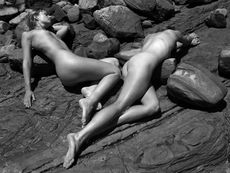
With Nelson going through the various of phases associated with death (initial pain, stoicism, boredom, dirty story telling, delirium), the French and Spanish ships looked in vain for the referees to stop the battle for half time so that they could go back to Cadiz for urgent repairs. But the British refused to stop and one by one, the allied vessels began to surrender. By the time Nelson died, only the stubborn French ship Sarkozy refused to surrender until it blew up and sank in the smoke of self-importance. One woman did escape and swam to the nearby British ship Rolling Stones. Her plaintive plea was, Meeek..meeek...I know you are big boy down there, save your old friend Carla and I won't talk about.... Captain Michael Jagger brought on her deck and sent Carla to his bed to get warmed up for a nostalgic romp later.[6]
In the confusion, and with many English sailors now blind drunk in celebration, some of the Spanish and French boats did slip away including Admiral Gravina's battered flagship Sangria. However, he had sat on a rusty spoon during the battle and would die a few months later when he refused all medical help to have it removed. Gravina died with the implement still in him, but was hailed in Spain as a great war hero (even though he was Sicilian!).
The French admiral Villeneuve was captured alive and shipped to England as a battle trophy. He complained so much about rain and English cooking that King George III swapped the moaning Frenchman for a new hat. Back in France, Villeneuve tried to explain that Trafalgar wasn't his fault and that at least Nelson was dead, which he counted as a result. Napoleon didn't laugh and told Villeneuve he was 'bad luck' and banished him from the imperial court. A few weeks later, Villeneuve was found dead, his sudden demise being blamed on the disgraced admiral's eccentric decision to re-cut his trousers, fatally stabbing himself six times in the process.
Battle Losses
The British claimed none of their ships were sunk and that all the French and Spanish boats had run up the white flag. As ever, the truth was somewhere between the devil and the deep blue computer. There were many losses and strange captures. The British claimed they hauled on board various famous people who had been running out the guns or barking orders. Amongst the French prisoners were Edith Piaf and Plastic Bertrand (he had floated and was a Belgian, but that was part of France then). Also captured were Johnny Halliday, Brigit Bardot and the cast of Les Miserables. Amongst the Spanish prisoners were Paris Hilton (I got caught up in all this....I thought I was on a fun trip), Rafael Nadal and El Cid. It was quite a bag. But the British also mourned their losses: David Beckham, Wayne Rooney, Rio Ferdinand....Okay, not so bad then. Victoria Beckham survived but was shunned.
The Americans
Just as the battle was finishing, an American fleet appeared under the command of Commodore Edward Preble. He recently been involved in a War Against Naval Terrorism off the coast of North Africa. Also called the First Barbary-Bush War (it was started when the East African pirate leader Barack Al-Quaida had insulted George Dubya Bush's mother), Preble's fleet said they were hunting for naval terrorists off the coast of Spain when they heard the noise of battle. The American commodore later inflated his importance in the battle with his book I Won Trafalgar for the Lousy Limeys. American resentment that their role had been ignored upset them so much that they decided to take it out on the Canadians for being so damn 'Lake Superior' in the War of 1812.
Aftermath & International Consequences
Following the battle of Trafalgar, Napoleon vowed to beat England by enforcing a trade blockade. He also stopped having baths and switched to regular showers. It was said by France's Foreign minister Charles 'Shit-Stockings' Tallyrand that Napoleon had driven himself nearly half mad by constantly re-fighting Trafalgar in his bath, with rubber ducks as stand-ins for the rival fleets.
Nelson's body was brought back to London inside a Watney's Red Barrel and buried in St. Paul's cathedral upright. A few years later, a new square in London was laid out to commemorate Nelson's victories. It was going to be called 'Up Yours Johnny Foreigner Square', but the name was changed to Trafalgar on the orders of Queen Victoria so as not to offend her German husband, Prince Albert of Saxe-Coburg-Goiter.
Trafalgar and Hollywood
A film titled Red in the Water was made some years after with Tom Hanks as Nelson and Hugh Grant as the French admiral Jacques Villeneuve. Penélope Cruz appeared in a rare cross gender role as the Spanish admiral Gravina (even though he wasn't Spanish). Taking most of the screen time was Will Smith, cast as the U.S. Navy Seal 'Flip Flipper' who stole the French and Spanish naval code books and passed them to the ungrateful British. When Flipper reminds them after the Battle of Trafalgar about what he has done, the bashful Brits abolish the Slave Trade but carry on slavery for another 25 years as part of a 'transition process'.
Grant's casting as the French admiral caused some upset in Britain, but the director Steven Spielberg said this was normal, as only the Brits could play sneering villains on screen. He also said Americans wouldn't have accepted a British actor in the role of Nelson, but Hanks' horrible attempt at sounding British placed his accent closer to Bondi Beach than the Norfolk Broads.[7].
Some of the other ships involved
Britain:
- HMS Chinless
- HMS Yobbo
- HMS Totty
- HMS Cannonball Magnet
- HMS Penetrable
- HMS Interminable
- HMS Ridiculous
- HMS Porous
- HMS Crumpet
- HMS Glory Hole
France:
- FNS Celine Dion
- FNS Le Tete Mais Zidane
- FNS Arsene Wenger
- FNS Canard à l'Orange
- FNS Naf Naf
- FNS FCUK
- FNS Jacques Tati
- FNS Fifi
- FNS Merde
Spain:
- FN Real Madrid
- FN Raul
- FN Vacaciones baratas para Lazy Fat Inglés
- FN Toro Rojo
- FN Almodovar
- FN Victoria Abril
- FN Pelotas
- FN Costa Coffee
USA:
- USS Teabag
- USS Second Amendment
- USS Sarah Palin
- USS FoxNews
Footnotes
- ↑ Nelson had torn up his British passport in 1802 and had applied for Brazilian citizenship when he was apparently 'permanently drydocked' after an incident after the Battle of Copenhagen. So technically Nelson was 'stateless'. The British hushed this story up, but to this day, Brazilians claim Nelson as one of their own by adoption.
- ↑ Being ungrateful and imperially minded was later carried on by the Americans after 1945.
- ↑ In the spirit of Nelson, England and Britain are synonymous in this article. So if you're Irish, Scottish, or Welsh reading this - tough Paris Hilton titties.
- ↑ The English were convinced everyone else needed to get drunk to fight. They didn't need any excuse.
- ↑ It was a British spy ship, hence the name to confuse the enemy.
- ↑ He later dropped her off the side when she 'nagged' him.
- ↑ Nelson always said that, after the war, he would go back to Norfolk with his own broad, a comment he was careful not to repeat when Emma was about.
